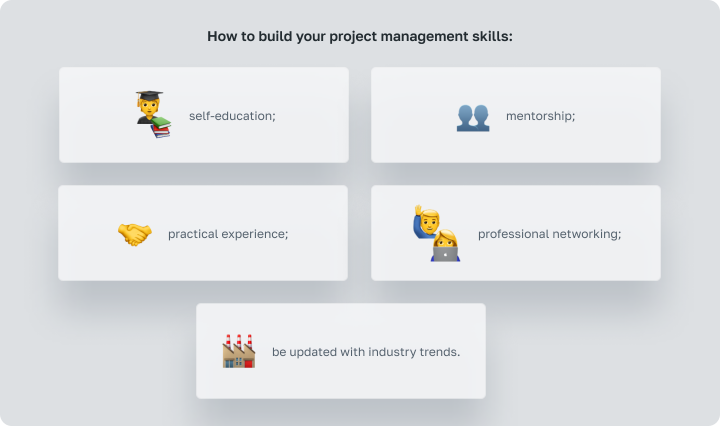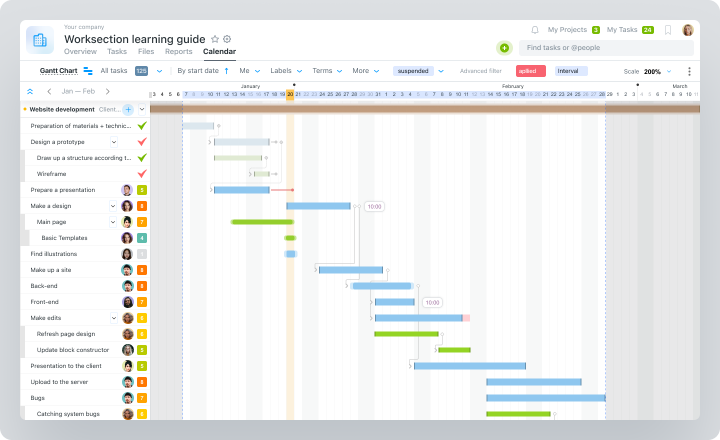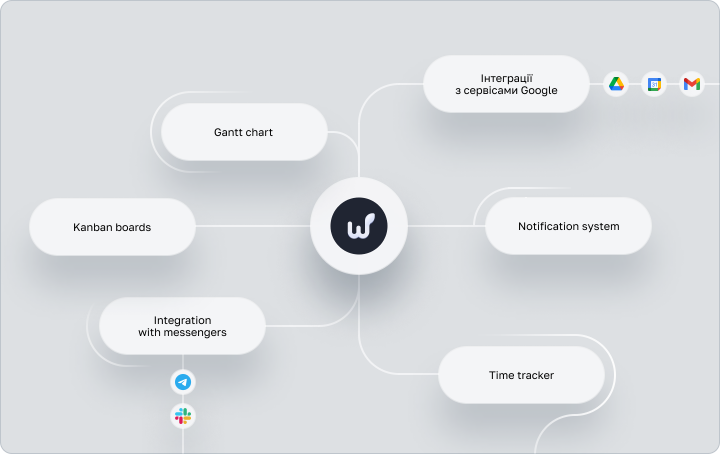Project management is a field that has been in constant evolution over the last couple of decades. It's critical to the success of companies and organizations in a wide range of industries.
The role of the project manager has evolved in response to advances in technology and changes in market dynamics. Project managers are responsible for:
- delivering projects within scope, time;
- leading teams and coordinate it;
- managing stakeholder expectations;
- navigating complex business environments.

This comprehensive guide offers an expanded overview of project management, underscoring the importance of project management skills in sectors ranging from construction and IT to law and finance.
What Are Project Management Skills?
Project management skills are an amalgamation of various competencies that a project manager must possess to successfully oversee, execute, and complete projects. These skills are diverse and multifaceted, requiring a balance between technical know-how, interpersonal aptitude, and specific industry-related knowledge.
These key project management skills can be categorized into three main areas:
- Hard project management skills are the tangible, teachable abilities that are crucial in the planning and execution stages of a project. They form the foundation of a project manager's technical expertise.
- Soft project management skills pertain to the interpersonal and behavioral aspects of project management. These skills are critical for leading teams, managing stakeholder expectations, and ensuring a cohesive project environment.
- Technical project management skills are specialized competencies related to the specific area of project management. These skills are often industry-specific and require a deep understanding of particular methodologies and practices.
Project Management Hard Skills
Hard project management skills needed for project management are the bedrock of effective project management, enabling managers to handle the specific aspects of projects.

Key hard project management skills include
Budgeting and Financial Management
Mastering budgeting is critical to controlling costs and ensuring financial profitability. This includes developing detailed budgets, forecasting expenses, and monitoring spending against the budget.
For example, in the development of a new software application, the project manager must budget for developer salaries, software licenses, testing resources, and marketing expenses.
Poor budget management in this case can result in inadequate resources for critical phases like testing or marketing, impacting the overall quality and success of the software. On the other hand, a well-managed budget ensures that sufficient funds are allocated to each phase of development, enabling the timely release of a high-quality product.
Scheduling and Time Management
Effective scheduling ensures that projects are completed on time. This involves creating detailed project plans, setting realistic timelines, and allocating resources efficiently.
Let's look at the manufacturing industry. Consider a case study of a company that is tasked with the production of a new line of electronic devices.
The project required a detailed schedule, coordinating various components such as parts procurement, assembly line setup, quality testing, and product distribution. Delays in any of these components could lead to significant production hold-ups and increased costs.
By meticulously planning and adjusting the schedule as needed, the project manager was able to synchronize these components, ensuring that the production line operated smoothly and met its launch deadline. This demonstrates how precise scheduling in manufacturing projects is vital for aligning various processes and avoiding costly delays.
Mastery of Project Management Software and Tools
This skill entails a deep understanding and proficient use of various tools and software that are designed to facilitate the planning, execution, monitoring, and closing of projects. Project management software and tools help streamline complex processes, enhance communication, improve task tracking, and provide valuable insights into project performance.
A skilled project manager is familiar with variety of project management software and tools. This includes traditional tools like Gantt charts and Kanban boards, as well as modern software solutions like Microsoft Project, Asana, Trello, JIRA, and Worksection. Each tool or software has its unique features and is suitable for different types of projects and management styles.
Project Management Soft Skills
Soft project management skills are crucial for managing teams and ensuring project success.

Key soft project management skills include
Effective Communication
Effective communication is essential in all aspects of project management, from team coordination to stakeholder management and conflict resolution.
It involves a variety of techniques and requires adaptability to different contexts, including challenges posed by remote team communication.
By mastering effective communication, project managers can significantly enhance team collaboration, stakeholder engagement, and overall project success.
Leadership and Team Building
Leadership and Team Building abilities are crucial aspects of effective team management. Common leadership styles include:
- transformational, where leaders inspire and motivate team members to exceed expectations;
- democratic, where decision-making is shared among the team;
- autocratic, suitable for high-stakes decisions where quick action is needed.
A positive team culture is built on trust, respect, and open communication. It recommends creating an environment where team members feel valued and safe to express their ideas and concerns. This involves regular check-ups, constructive feedback, and recognizing achievements. A positive culture encourages collaboration, innovation, and a strong team spirit.
Problem-solving and Creativity
Problem-solving and creative thinking are essential project management skills for project managers. They enable them to overcome challenges and develop innovative solutions. Through the application of these skills, project managers can find effective solutions that lead to successful project outcomes.
For example, a manufacturing project is experiencing high production costs, problem-solving methodologies like RCA and SWOT analysis can identify inefficiencies and areas for cost reduction.
Or a tech company facing customer dissatisfaction due to software bugs, brainstorming and lateral thinking can lead to innovative quality assurance processes that enhance product reliability.
Project Management Technical Skills
Technical project management skills are specialized competencies specific to project management.

Key tech project management skills include
Data Analysis and Reporting
Data analysis and reporting are fundamental skills in project management, enabling project managers to extract meaningful insights from data and make informed decisions. Proficiency in these skills involves using various tools and techniques to analyze project performance, assess progress, and communicate findings to stakeholders.
Effective reporting involves presenting data analysis findings in a clear and concise manner. This includes creating progress reports, status updates, and dashboards that provide stakeholders with an overview of the project's health and future projections.
Risk Management and Mitigation
Risk management and mitigation are critical for managing the uncertainties inherent in projects. This involves identifying potential risks, assessing their impact and likelihood, and developing strategies to mitigate or avoid them.
For instance, in construction projects, risks might include delays due to weather, cost overruns, or safety incidents. In IT projects, risks could be related to data security, technology obsolescence, or scope creep.
Industry-Specific Knowledge
The project manager's role involves not only managing the project itself, but also navigating industry-specific challenges and ensuring compliance with relevant standards and practices.
Industry-specific knowledge is essential for project managers to ensure projects comply with industry standards and meet specific market demands. Each industry has unique challenges and requirements, and understanding these nuances is key to project success.
Top Soft Skills for Project Managers
In order to lead teams and manage complex projects effectively, project managers need a unique blend of soft skills. These capabilities are critical to fostering teamwork, managing challenges and delivering projects.

Communication
Effective communication means being able to explain current project goals, job updates, and give feedback clearly. Project manager is also supposed to listen not only to the team members, but also stakeholders.Stress Management
Stress management is an essential project management skill for maintaining personal well-being and clear decision-making. It involves recognizing the signs of stress and using techniques to manage it effectively.
Adaptability
Adaptability helps to stay flexible and respond effectively to change. For a project manager, this means adjusting strategies and plans when unexpected issues arise or project requirements change.
Conflict Resolution
Conflict resolution is a valuable skill for maintaining harmony within the team. It involves identifying the root causes of disagreements, facilitating open discussions, and finding acceptable solutions.
Emotional Intelligence
Emotional intelligence is the ability to recognize, understand, and manage your own emotions. And at the same time perceive and influence the emotions of others.
Top Hard Skills for Project Managers
Each of these hard project management skills is essential to the core business. They ensure that projects are managed not only with interpersonal delicacy, but also with technical and practical proficiency.

Project Scheduling
Project scheduling is about strategically organizing tasks to ensure the project flows smoothly from one phase to the next. This involves understanding dependencies between tasks, estimating deadlines accurately, and adjusting schedules as needed.Using Project Tools
This skill involves selecting the right tools for specific project needs, whether it's for task management, collaboration, or resource tracking. A project manager adept in project management tools can streamline workflows, keep the team aligned, and provide real-time insights into the project's status.
Budget Management
Managing a budget in project management is a delicate balance between resource allocation, cost forecasting and financial analysis. It requires an understanding of how to allocate funds effectively, track spending against the budget, and make adjustments to avoid overruns.
Risk Management
Risk management means the ability to find a way to avoid or tackle unexpectable challenges. This involves identifying risks, assessing their potential impact, and developing strategies to mitigate them.
Resource Allocation
Resource allocation is the art of efficiently distributing and utilizing resources like manpower, materials, and equipment. It’s about ensuring that the right resources are available at the right time and place, optimizing their use to enhance project efficiency and effectiveness.
Top Technical Skills for Project Managers
Technical project management skills provide project managers with the expertise needed to manage the specific requirements and complexities of projects. They guarantee successful project delivery, regardless of the business sector.

Data Analysis
Data analysis involves collecting, interpreting, and using data to guide project direction. A project manager must be adept at analyzing trends, predicting outcomes, and deriving actionable insights from data.
Industry-Specific Knowledge
Having in-depth knowledge of the specific industry related to the project is very important. This requires an understanding of industry standards, practices, and trends.
Regulatory Compliance
Understanding and complying with relevant laws helps keep projects in compliance with all legal requirements. This helps avoid potential legal issues and guarantees that the project is conducted ethically and responsibly.
Technical Problem-Solving
Technical problem-solving involves addressing technical challenges that arise during a project. It requires a deep understanding of the technical aspects of the project and the ability to devise effective solutions to technical problems, ensuring the project's smooth execution.
Quality Assurance
Quality Assurance is a systematic process designed to ensure that a product or service meets specified requirements and standards. It plays a crucial role in maintaining high standards throughout the lifecycle of a project.
Minimal Project Manager Required Skills
To be effective in their role, every project manager needs a foundational set of abilities. These competencies are the basic building blocks for any project manager.
While more advanced skills and expertise can be developed over time, these core project management skills provide the foundation for effective workflow coordination.
Here’s a basic project management skills list

Basic Budgeting and Financial Management
Budgets are used to plan an organization's expenses and revenues for a specific period of time. A project manager should be able to create a budget, track expenses, and manage project finances to prevent overspending.Fundamental Scheduling Skills
Schedule translates the project's scope, time, cost, and quality action plan into a work schedule. If you have strong time management skills, you place great value on when and how long something happens.
Basic Risk Identification
That's where risk management comes in, helping businesses understand and prepare for the risks they might face. A project manager should be able to identify obvious risks and have a simple plan to address them.
How to Build Your Project Management Skills
Developing project management skills is a continuous process that involves various strategies. Here’s an exploration of additional methods for enhancing project management capabilities.

Attending Workshops and Conferences
Workshops and conferences are excellent opportunities for project managers to learn about the latest trends, tools, and methodologies in the field. These events often feature expert speakers, case studies, and interactive sessions where attendees can gain new insights and practical knowledge.Engaging in Online Learning Platforms
Online learning platforms offer a wealth of resources for project managers looking to enhance their skills. Platforms such as Coursera or LinkedIn Learning provide courses on a wide range of topics, from foundational project management principles to advanced techniques and specialized areas.
Insights from Successful Project Managers
Interviews or quotes from successful project managers can offer guidance and inspiration for those looking to advance in the field. Such insights highlight the value of real-world experience and the soft skills required in project management.
By leveraging workshops, online courses, community engagement, insights from experienced professionals, and a combination of formal education and practical experience, aspiring project managers can build a robust skill set that prepares them for the challenges and opportunities of this dynamic field.
Modern Project Management Tools
Knowing and using modern project management tools can greatly improve the efficiency and effectiveness. Here are key tools in Worksection that project managers will find useful:
Time Tracking and Reporting
It allows you to track the time spent on each task and project. This is critical for deadline management, effective resource allocation, and project profitability.

Task and Subtask Management
Worksection's interface allows project managers to monitor task progress, delegate responsibilities, and ensure that projects stay on schedule.
Gantt Charts for Scheduling
The Gantt chart tool in Worksection provides a visual representation of the project timeline, illustrating task durations, dependencies, and milestones.
Real-Time Notifications and Alerts
Stay updated with real-time notifications and alerts on task progress, deadlines, and any changes in the project.

Collaboration and Communication Tools
Worksection fosters teamwork through its integrated communication tools. Project managers can streamline collaboration by facilitating discussions, sharing files, and providing feedback directly within the platform.
The use of these tools in daily project execution makes it easier and more efficient for managers to handle the complex projects of the current business world.
Conclusion
This comprehensive guide to project management skills provides a deep understanding of the various competencies required for effective project management. By continuously developing these project management skills and staying abreast of industry changes, you can significantly enhance their effectiveness and contribute to the successful completion of projects.
